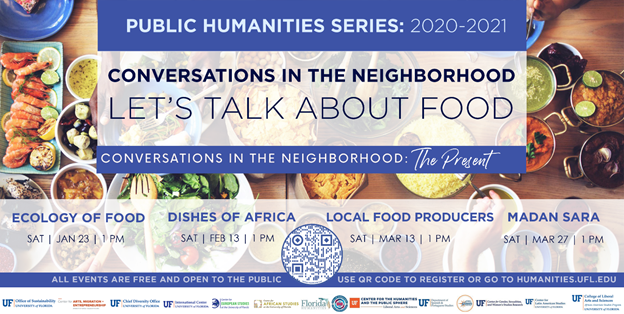
- This event has passed.
Ecology of Food
January 23, 2021 @ 1:00 pm
Free
In this panel, seed activists and scholars present on the practices of food storage. It highlights connections between seed keeping in Gainesville, Florida, and the Caribbean, and West Africa. It also explores the relationship between food sovereignty, cultural preservation, and food diversity.
This event will be recorded. Please pre-register for this event through the Zoom link.
Moderator
Alexandra Cenatus holds an M.A in Latin American Studies and a B.A. in Political Science from the University of Florida. Cenatus’ research interests center on how gender, religion, race, and class interact, with a focus on Haiti. In 2015, she received funding from the UF-Duke National Endowment for the Humanities (NEH) grant to explore the social role of priestesses in Haitian Vodou. Her M.A. thesis builds on this research and analyzes the ways in which Haiti’s social changes affect the economic livelihood of Haitian Vodou priestesses. Cenatus is currently working on creating an online exhibit that will showcase the experiences of Haitian immigrants in the United States: The Haitian American Dream, a digital humanities project from the UF Mellon Intersections Group on Global Blackness and Latinx Identity.
Meet the Speakers
Melissa DeSa is a co-founder of Working Food, a non-profit organization based in Gainesville, Florida. She is a University of Florida graduate, with a Master’s degree in Interdisciplinary Ecology. Her background and passion for wildlife and wild places, has brought a depth of knowledge and understanding of her current non-profit work tackling food systems. She has 10 years of experience in non-profit start-up and management, community organizing, food systems, seed stewardship, gardening, farming, education, and outreach. Her work focuses on making seed stewardship and youth education accessible and community-oriented. Her efforts to promote agricultural biodiversity through seed stewardship and outreach focus primarily on working with family farmers, underprivileged youth, and adults with disabilities. She has built Working Food’s Southern Heritage Seed Collective organically over 10 years, growing it from a small seed library to a thriving community program providing classes, workshops, training, regional seed varieties, and collaborative work on seed systems projects with regional and national partners. She currently serves on the advisory board for both Southern SARE, the Southeast Slow Food Ark of Taste, and Grow Hub.
Richard Fethiere is an agronomist with over thirty years’ experience in international development, environmental agriculture, agricultural extension, program assessment and evaluation, staff training, and higher education. He earned his bachelor’s degree in Agricultural Engineering at the University of Haiti and his master’s degree at the University of Florida in Animal Nutrition. He began his career as a researcher at the poultry production unit of the University of Haiti. He continued at the Agronomy Department of the University of Florida as a Research Coordinator and Forage Lab Manager. He spent much of his profession consulting on development projects in Haiti, the West Indies, South America, and Africa. Significant accomplishments in expense reduction have led to Mr. Fethiere receiving a Superior accomplishment award from the University of Florida. Mr. Fethiere has done consulting work for the Office of the Prime Minister of Haiti in 2013; for USAID in Haiti from 2009 to 2016; and Africa and Guyana from 2019 to 2020.
Sponsors
Conversations in the Neighborhood: Let’s Talk About Food is funded by a Community Project Grant from the Florida Humanities Council, the Office of Equity and Inclusion in the City of Gainesville, the University of Florida (UF) Center for the Humanities and the Public Sphere (Rothman Endowment), UF Chief Diversity Officer, UF Center for Gender, Sexualities & Women’s Studies Research, UF Department of Spanish and Portuguese Studies, UF Center for Latin American Studies, UF Samuel Proctor Oral History Program, UF Center for African Studies, UF African American Studies program, UF Languages, Literatures, and Cultures, UF Center for European Studies, UF International Center, UF Center for Arts, Migration, and Entrepreneurship, and UF Office of Sustainability.
For more information about the series, visit: https://humanities.ufl.edu/conversations-in-the-neighborhood-lets-talk-about-food/